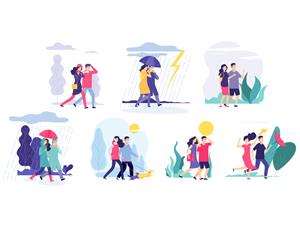Before learning the new words, let repeat the known ones from other grades.
Pirms jauno vārdiņu mācīšanās, atkārto jau zināmos vārdus no iepriekšējām klasēm!
- 2. klase — "Weather words I" un "Weather words II".
- 5. klase — "Weather I" un "Weather II".
Svarīgi!
To check yourself, let's do the exercise.
Lai pārbaudītu sevi, izpildi uzdevumu!
Asking about the weather
Jautājot par laikapstākļiem
To ask about the weather we use the appropriate tense of the verb "to BE".
Jautājot par laikapstākļiem, mēs izmantojam darbības vārda "BE" attiecīgo laiku.
Pagātne
What was the weather like in Egypt two days ago?
It was sunny and hot in Egypt two days ago.
Tagadne
What's the weather like in Estonia today?
It's foggy and chilly in Estonia today.
Nākotne
What will the weather be like in Lithuania tomorrow?
It'll be snowy and freezing in Lithuania tomorrow.
Read, listen and learn some new words.
Lasi, klausies un mācies jaunos vārdiņus!
Lasi, klausies un mācies jaunos vārdiņus!

breeze — [briːz] — vēsma, brīze, viegls vējiņš
hurricane — [ˈhʌr.ɪ.kən] — viesuļvētra, orkāns
storm — [stɔːm] — vētra
shower — [ʃaʊər] — lietusgāze (īslaicīga)
dew — [djuː] — rasa
frost — [frɒst] — sarma
hail — [heɪl] — krusa
thunderstorm — [ˈθʌn.də.stɔːm] — negaiss, pērkona negaiss
Northern Lights — [ˌnɔː.ðən ˈlaɪts] — ziemeļblāzma
sleet — [sliːt] — slapjdraņķis
snowstorm — [ˈsnəʊ.stɔːm] — sniegputenis, putenis
Piemērs:
They knew they could not find their way to safety because of the snowstorm, so they walked to some trees and stayed there. — Viņi zināja, ka viņi sniegputeņa dēļ neatradīs ceļu uz drošību, tāpēc viņi aizgāja pie dažiem kokiem un tur arī palika.